Penn Road Dairy
The
dairy was a pretty much a self-contained unit. There was an
office, a transport department which looked after the lorries
for the transportation of milk churns to and from the milk
suppliers, and milk floats for delivery of the finished products
to customers. There was also a vehicle maintenance department. |
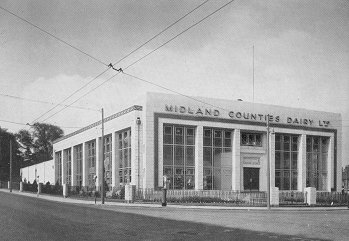
Penn Road
Dairy. |
|
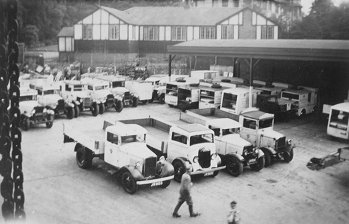
The back yard behind the dairy. |
The
treatment facilities for the milk, and the bottling plant used
the latest technology.
When the dairy opened there were about 130 staff and just over
60 rounds. Mr. J.A. Birch was Chief Executive Officer and Mr. J.
Greig was cashier until 1940 when he became Personnel Manager. |
| Another view of the back
yard showing some of the many milk lorries and milk floats that
were housed there.
On the extreme right in the background
is "The Lindens" the only building in the photograph that still
survives. |
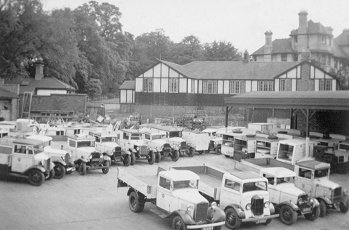 |
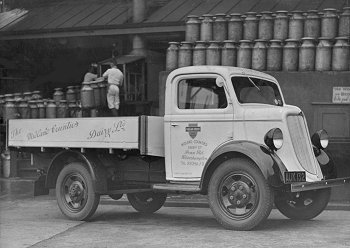
The milk churn loading and unloading bay.
|
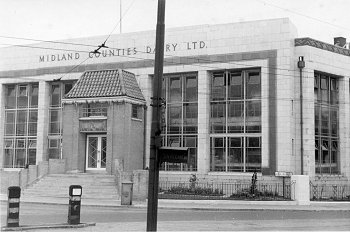 |
Another and later view of
the dairy from across Lea Road. |
| The bottling plant showing
filled bottles being loaded into crates. Each crate held 12
bottles and two crates were loaded at a time. |
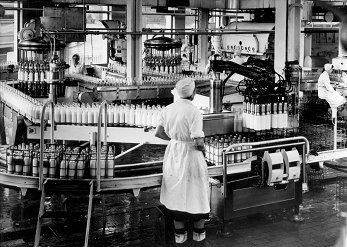 |
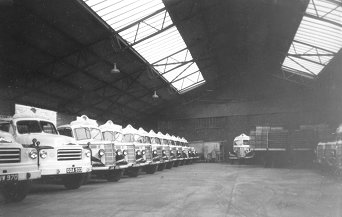 |
Some of the many milk
lorries. |
| The new
building greatly impressed J.B. Priestley as can be seen from
the following extract from “English Journey”:
“I remember noticing in Wolverhampton after half-an-hour
of dingy higgledy piggledy the new building of The Midland
Counties Dairy, white and trim and with immense windows and
thinking how alien it looked there, like an outpost of a new
civilisation.” |
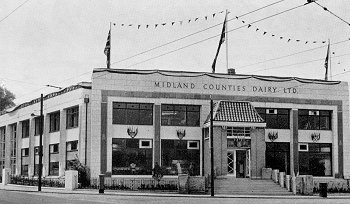
The dairy decorated for the Coronation in
1953. |
|
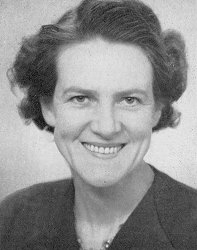
Miss Nora Pennie, N.D.D. |
From October 1941 the laboratory at Lea Road was
run by Miss Nora Pennie, N.D.D. She also advised farmers on how
to produce high quality milk and was General Secretary of the
Dairy Social Club.
She was very keen on table tennis and led the women’s team in the
Wolverhampton and District Table Tennis League. There was also a
Farms Inspection Department and a laboratory at Birmingham. The
laboratories ensured that high quality milk and food-stuffs came
from the farms. |
|
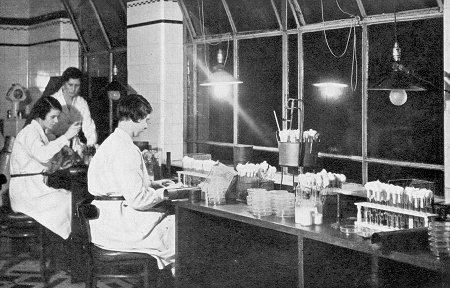
A corner of the laboratory. |
The laboratory also carried out bacterial testing, and
butter-fat testing. Milk from each farm was tested and the
Farmer's Clean Milk Bonus was awarded to farmers who
supplied milk with a low bacterial content, and rich in
butter-fat. |
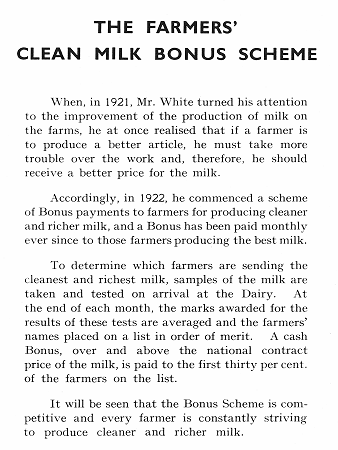
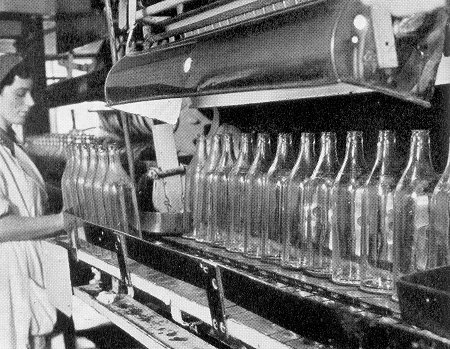
A bottle washing machine.
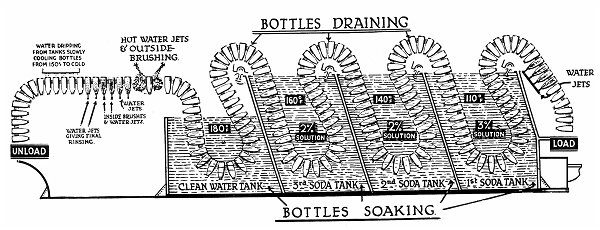
How a bottle washing machine worked.
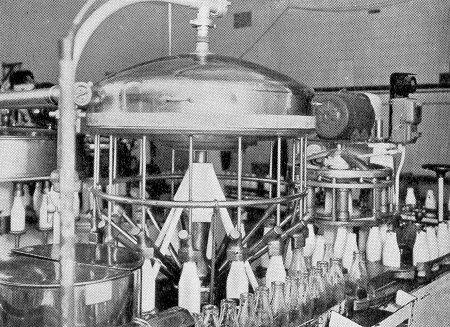
The filling room.
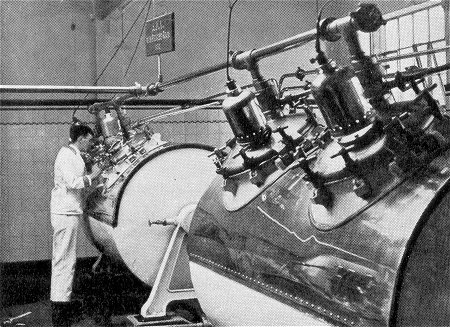
The pasteurising room.
| A corner of the vehicle
maintenance department. |
 |
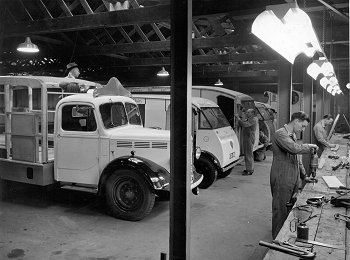 |
Another view of the vehicle
maintenance department. |
| Examining an engine block in
the vehicle maintenance department. |
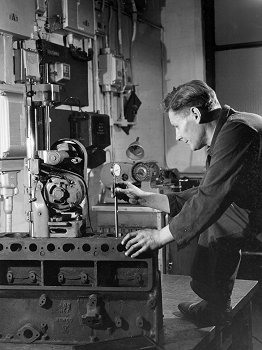 |
|
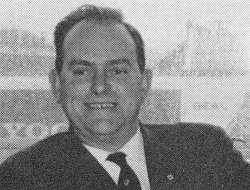
Mr. Dennis Miers. |
The transport department was ably assisted by
Miers Transport Company Limited of Showell Road. The company,
started by Reg Miers in 1925 began transporting milk to the
Cobden Lane depot in Wolverhampton and to Birmingham in 1926.
Close ties developed between the dairy and Miers and they joined
forces in 1966.
Reg's son Dennis joined the company in 1949 and later became
Managing Director. |
| From about 1940 Fred Collins was Transport
Manager at Lea Road and he became General Manager of Operations
at Wolverhampton in 1964. |
| In 1944 a trailer system was developed at the
dairy when a second-hand Scammel “mechanical horse” and two
trailers were purchased.
This was a great success and the fleet grew to 54 low-loading
trailers that were loaded by fork lift truck. The trucks could
drive up to the sterilising tanks, pick-up the stillage of
bottled milk and load it directly onto the trailer. It took from
10 to 12 minutes to fully load a trailer which was comparable to
the speed of milk production. |
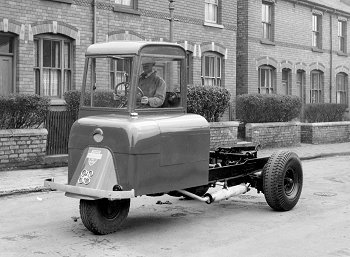
One of the "mechanical horses". |
|
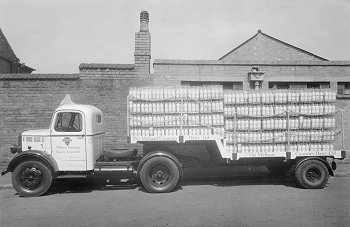
A loaded trailer. |
The trailer then delivered its load of milk
bottles to a depot where it would be reloaded with “empties” for
the return journey.
The trailers were known as “Queen Mary’s”. |
| The company encouraged the development of
electrically powered vehicles for milk delivery thanks to the
enthusiasm of Jim White.
He also visited North America several times to study
developments in the production and sales of ice cream. |
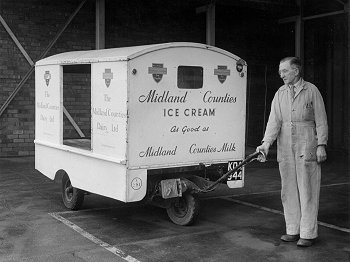
An early hand-operated electric
delivery truck. |
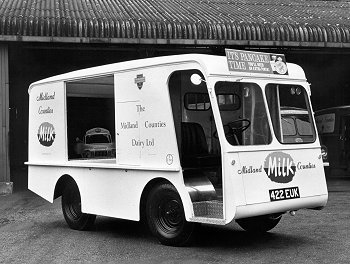 |
The now familiar
battery-powered milkfloat. |
| Midland Counties Dairy and Miers Transport worked
in collaboration with the Milk Marketing Board to pioneer the
Commercial Bulk Milk Collection Scheme in 1957.
Tankers were used to collect milk in bulk from farmers, which
was more hygienic and cheaper than the old method using milk
churns. |
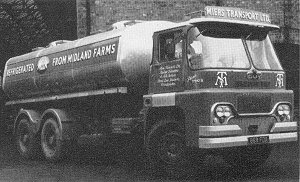
A Miers milk tanker. |
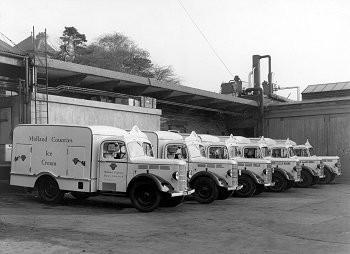 |
Ice cream delivery lorries
in the back yard at Lea Road. |
 |
An ice cream salesman with his sales
trolley, possibly outside West Park. |
| In the second half of 1957 the Lea Road dairy was
extended when the receiving room and checking office were
demolished and replaced by a larger building. The new 2 storey
building contained a receiving room, checking room and tanker
bay on the ground floor and a laboratory, lecture room, tea
room, first aid room and cloakrooms on the first floor. While
work on the new building progressed the dairy operated as normal
except for the first month, when milk from the farms went to the
creamery at Welshpool to be delivered to the dairy in road
tankers. |
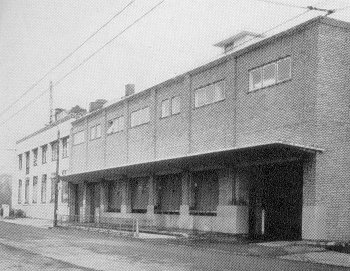
The extension after completion. |
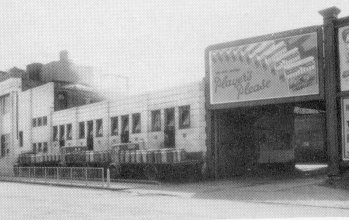
| The view from Lea
Road at the end of July 1957 before work began. |
|
At this time building work went on both day and
night. The new cloakrooms were tiled throughout and fitted with
in-floor electric heating and had showers and baths. There was
also an electric lift to convey samples directly from the
receiving deck to the laboratory.
The extension was completed in December 1957 and designed by
Messrs. Jennings, Homer and Lynch. The building work was carried
out by Tarmac’s Civil Engineering Division. |
| A road tanker discharging in
the new tanker bay. |
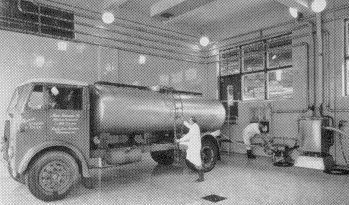 |
|
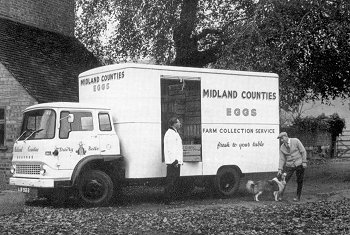
One of the egg collection vehicles. |
The company also had an egg packing plant at Fern
Road, Wolverhampton, just round the corner from the dairy. It
was run by Mr. Keith Helliwell and a staff of 20 girls using the
latest equipment.
There were three egg collection vehicles that collected eggs
from farms in Staffordshire and Shropshire in wooden containers
that were supplied by the dairy. Each container held 12 trays of
30 eggs. |
| At Fern Road there were three grading units and
each farmer’s consignment was handled individually. Six eggs
were handled at a time and were initially conveyed into a
“candling booth” where the eggs passed in front of a bright
light so that the operator could assess the quality of each egg.
Cracked, stale or unsatisfactory eggs were rejected at this
point. The eggs then entered a grader where they were weighed,
graded and stamped with the “Lion mark” and the grade. |
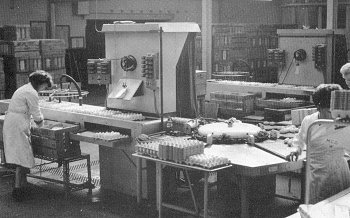
A grading unit. |
|
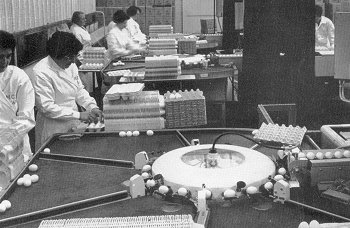
One of the grading tables. |
The unit handled 720,000 eggs per week and the
eggs were despatched to the depots on the day after they were
received from the farms. This ensured that eggs reached the
customer within 7 days and often much less. |
| Mrs. N. Bate in one of the
candling cubicles. The curtain in the background was drawn and
she used the bright light below the eggs to detect any faults. |
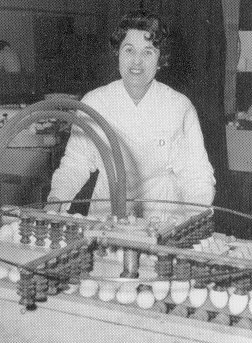 |
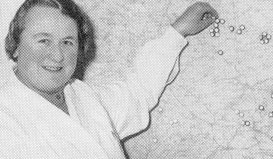 |
Supervisor, Mrs. A. Castle
with the map on which the location of the egg suppliers was
marked with coloured pins. |
| Mrs. H. Lock operating the
machine that lifted the eggs out of the trays and placed them
onto the waiting conveyor. |
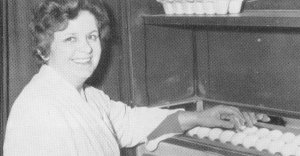 |
| Sporting activities were actively encouraged by
the company. Each year Wolverhampton and Birmingham teams
competed to win the “Challenge Shield”. Events included cricket,
tennis and bowls and were held at the Goodyear Sports Ground in
Wolverhampton or the Delta Metal’s Sports Ground at Erdington.
Wolverhampton dairy also had a successful football team that
entered the Wolverhampton Works League and played for the A.J.S.
cup. |
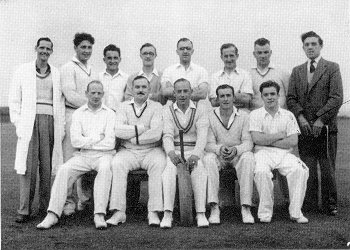 |
Wolverhampton cricket team.
Back row L. to R.:
Wills, Hodgkiss, D. Hodgkiss, J. Foster, Brown, Beards, Fellows
and Carter.
Front row L. to R.:
Willis, Cartwright, Fellows, Jenkins and Tranter. |
|
There was also a “25 year club” which was a social club
for employees that had worked at the company for 25 or more
years. Some of the members had been retired for many years.
|
 |
|
 |
|
 |
Return to
the
New Dairy |
|
Return to
the
beginning |
|
Proceed to
Personalities |
|